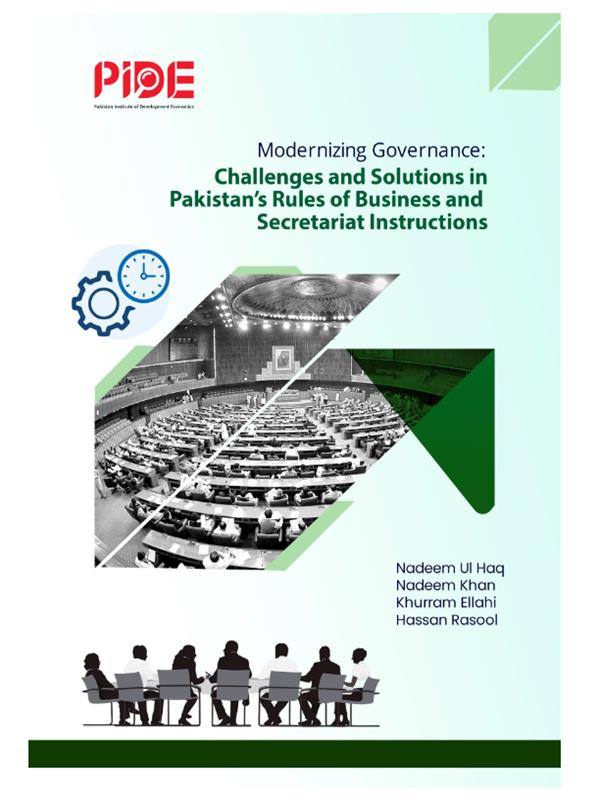
Pakistan Institute of Development Economics
- Home
Our Portals
MenuMenuMenuMenuMenuMenuMenu - ResearchMenuMenuMenuMenuMenuMenuMenu
- Discourse
- The PDR
- Our Researchers
- Academics
- Degree Verification
- Thesis Portal
- Our Portals
Modernizing Governance: Challenges and Solutions in Pakistan’s Rules of Business and Secretariat Instructions
Content
Section 1
Introduction Government Functioning – Rules of Business & Secretariate Instructions
Section II
Issues & Challenges
Rules of Business & Secretariate Instructions
Section III
Global Standards NPM & Post NPM
Section IV
Government and Private Organizations
Section V
Recommendations for Rules of Business & Secretariate Instructions proper implementation and effectiveness
Preamble
In the intricate landscape of modern governance, each state faces pivotal questions regarding the formulation and execution of rules, responsibilities, and compliance mechanisms. Striking a delicate balance between accountability and efficiency is paramount, as governments seek to navigate the complexities of decision-making. The functioning of a government is deeply entrenched in established rules and regulations, with the Rules of Business and Secretariat Instructions acting as fundamental documents guiding the operations of the federal government in Pakistan. However, despite their crucial role, these documents face challenges in adapting to contemporary governance requirements and embracing modern management techniques.
This discussion explores the complex problems in the Rules of Business (RoB) and Secretariat Instructions, revealing how they impact the federal government’s effectiveness, transparency, and adaptability. By thoroughly examining these challenges, the focus is on advocating for reform and suggesting solutions to enhance the optimal functioning of public sector organizations in Pakistan.
Section I
Introduction Government Functioning – Rules of Business & Secretariate Instructions
Each modern state must answer the following questions:
- What should be done: This means deciding who gets to make the rules.
- Who should do it: This is about choosing who will carry out these rules.
- How to make sure everyone follows the rules: This involves deciding how to check if things are being done the right way.
To answer these questions, it’s essential to find a balance between two important things: accountability and efficiency. If we focus a lot on accountability, strict rules will be in place, and only certified officials will handle things for the country. Success will be measured by how closely the rules are followed. On the other hand, if we prioritize efficiency, we’ll loosen up the rules and let others outside the government also handle tasks. The focus will be on getting good results rather than sticking strictly to the rules. It’s all about finding the right mix to make things work well.
Government functions through established rules and regulations, providing structure and order. These regulations cover various aspects, shaping policies and ensuring compliance. The Rules of Procedure of the Government exemplify how regulations are binding on government members and administrative bodies. Governments operate within established rules and procedures, which receive approval from the legislative bodies of their respective countries.
| When government departments, including legislative bodies, don’t operate effectively or adhere to modern management principles, it gives rise to a range of significant issues | |
| Inefficiency | The overall functioning of government processes becomes slow, leading to delays in decision-making and execution of essential tasks. |
| Service Disruptions | Public services, crucial for citizens, face interruptions or disruptions, impacting the smooth delivery of services. |
| Waste of Resources | Ineffective management results in the inefficient utilization of public resources, leading to unnecessary expenditures and resource misallocation. |
| Poor Governance | Governance practices may become ineffective, diminishing the government’s ability to provide transparent, accountable, and responsive services. |
| Legal and Compliance Issues | Failure to adhere to laws and regulations may result in legal and compliance issues, undermining the rule of law and eroding public trust. |
| Economic Impact | The overall economy can suffer consequently, with potential negative effects on economic development, investment, and stability. |
| Social and Environmental Consequences | Society may experience adverse effects, and environmental sustainability could be compromised due to inadequately managed government functions. |
| Ineffective Policy Implementation | Government policies, no matter how well-conceived, may fail to achieve their intended outcomes due to poor implementation practices. |
| Corruption Risks | Ineffective governance increases the risk of corrupt practices within government departments, undermining the integrity of public institutions.
|
| Weakened International Relations | Unreliable governance can strain relations with other nations, potentially hindering international collaborations and cooperation. |
Federal Government of Pakistan
The federal government of Pakistan follows two important documents: the Rules of Business and Secretariat Instructions. These documents outline the guidelines and steps that the federal government must follow in carrying out its functions. They serve as a manual that explains how the government operates and carries out its duties.
Rules of Business 1973
Within the government sector of Pakistan, the Rules of Business, 1973 serve as the foundational document, outlining the framework that governs administrative and decision-making processes. In India, the Allocation of Business Rules 1961 and the Transaction of Business Rules 1961 collectively provide the essential structure for the functioning of the government. Similarly, in England, the Ministerial Code 1997 is a crucial instrument utilized to ensure the effective and seamless operation of government matters.
These rules find their basis in the constitutional framework of Pakistan, specifically deriving authority from Article 90 and Article 99 of the Constitution. The regulations and guidelines outlined in these rules are shaped by the constitutional provisions delineated in these articles, which serve as the foundational pillars for the governance and decision-making processes within the country.



